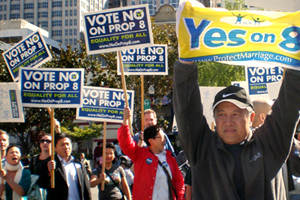The Obama administration has filed a legal brief on Thursday afternoon, urging the Supreme Court to repeal the California law banning same-sex marriage.
Two days ago, over 100 Republicans, who are of high-profile but do not hold any offices, signed an amicus, or friend-of-the-court, brief, supporting the lawsuit to bring down Proposition 8, a voter initiative that was approved after receiving over 750,000 legitimate signatures in California.
The executive branch argued in the brief that denying gay couples the right to marry violates the Constitution’s equal protection clause in the 14th Amendment. It also said that Prop 8 should be subject to “heightened scrutiny”, which is fails and thus is unconstitutional, according to New York Times.
"The brief pays closest attention to California and the other seven states that grant same-sex couples all the rights and responsibilities of marriage but insist on denying them the favored name," said Jane S. Schacter, a professor at Stanford Law School, according to ABC News. "But it advocates that the court adopt a much tougher, more skeptical approach to any state law that denies same-sex couples the right to marry."
"That approach is what lawyers call 'heightened scrutiny,'" she added, "and if it were faithfully applied to all state laws banning same-sex marriage, it would result in the invalidation of those laws."
 Same Sex Marriage in United States.
Same Sex Marriage in United States.
The government has noted in the brief seven other states – Delaware, Hawaii, Illinois, Nevada, New Jersey, Oregon, and Rhode Island – also grants rights associated with marriage to domestic partnership but the name.
Although the brief does not call for the repeal of the marriage ban on all other states, the implication is clear: if the court were to agree with the administration's position, gay marriage laws in seven other states could be in jeopardy.
The brief explained that “the designation of marriage, however, confers a special validation of the relationship between two individuals and conveys a message to society that domestic partnerships or civil unions cannot match.”
Donald B. Verrill Jr., the Solicitor General, wrote, "The exclusion of gay and lesbian couples from marriage does not substantially further any important governmental interest. Proposition 8 thus violates equal protection."
The government’s brief concludes by denouncing the California ban on same-sex marriage as based in “impermissible prejudice.” It then cited a concurrence in a 2001 Supreme Court case that said prejudice might not rise “from malice or hostile animus,” and might well be the result of “insensitivity caused by simple want or careful, rational reflection or from some instinctive mechanism to guard against people who appear to be different in some respects from ourselves.”
No matter, the brief said, “Prejudice may not, however, be the basis for differential treatment under the law.”
According to ABC News, a statement on behalf of ProtectMarriage.com, the proponent of Prop 8, described the Obama administration's decision to weigh in both "unprecedented" and "hardly surprising, but nevertheless disturbing."
"In his first term as president, Obama clearly stated that Americans can choose a special designation of marriage between man and woman, and that supporters of traditional marriage can hold that position without animus," said the statement by Andy Pugno, general counsel for ProtectMarriage.com. "He later remarked that it would be a 'mistake' to make the debate over redefining marriage into a federal issue.
"Yet today," the statement added, "by stating that the traditional definition of marriage is rooted only in irrational prejudice, the president has impugned the motives and actions of millions of Californians and turned his back on society's long-standing interest in both mothers and fathers raising the next generation."
In a brief that U.S. Catholic Association filed late last month, the pro-traditional marriage group argued that marriage based upon a union of one man and one woman as husband and wife are vital and foundational to the welfare of the society. If the government does not reinforce this institution with the “unique encouragement and support it deserves”, then societal ills that flow from the breakdown of marriage and family will only be “aggravated”.
The USCCB brief also notes that “Proposition 8 is not rendered invalid because some of its supporters were informed by religious or moral considerations. Many, if not most, of the significant social and political movements in our Nation’s history were based on precisely such considerations. Moreover, the argument to redefine marriage to include the union of persons of the same sex is similarly based on a combination of religious and moral considerations (albeit ones that are, in our view, flawed). As is well established in this Court’s precedent, the coincidence of law and morality, or law and religious teaching, does not detract from the rationality of a law.”



















